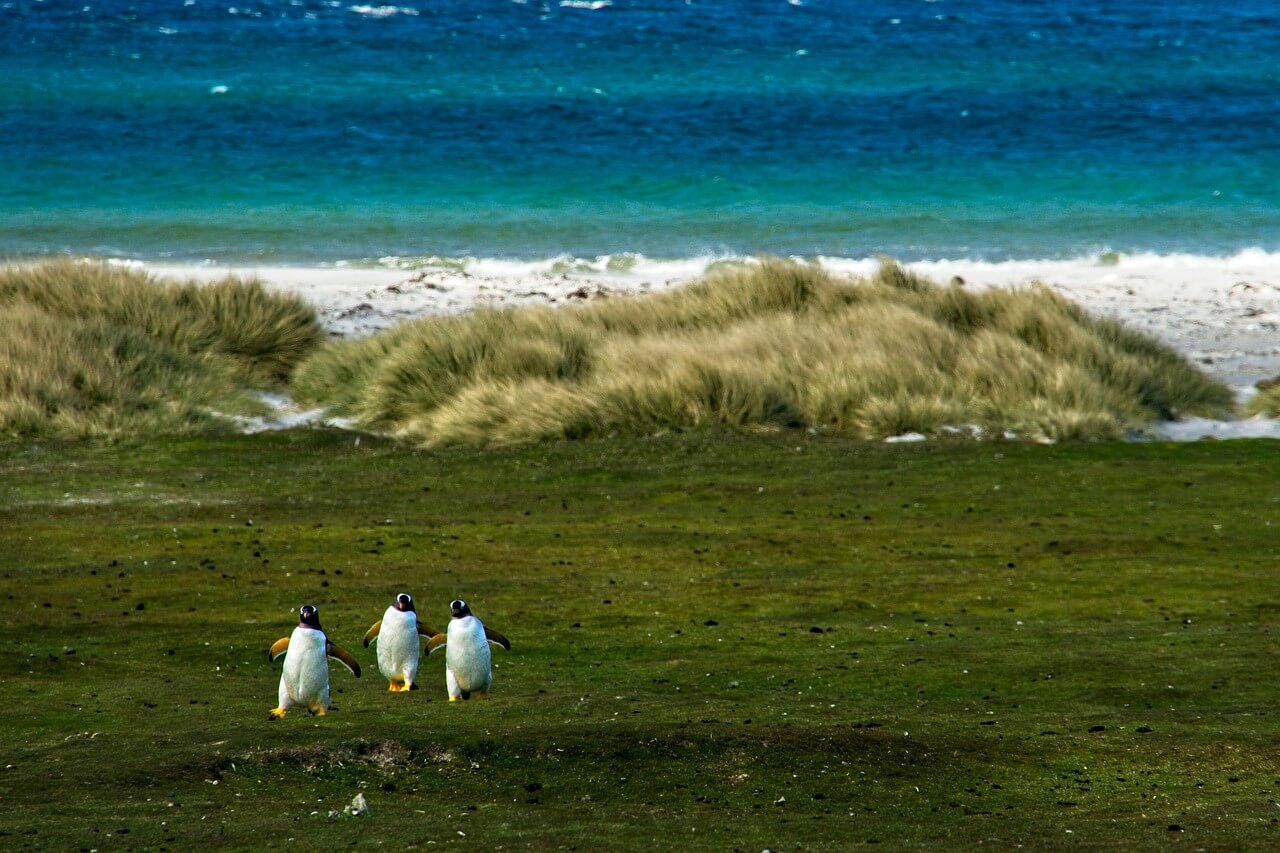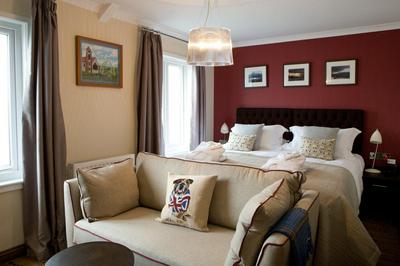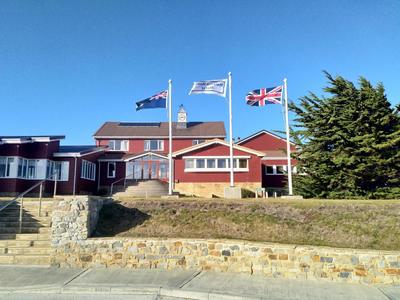When to visit Falkland Islands during the year?
The Falkland Islands experience a cool maritime climate, with temperatures ranging from 1°C to 20°C (34°F to 68°F) depending on the season. Summer, from November to March, sees the most visitors as temperatures are milder and wildlife is abundant. You can enjoy penguin watching at Volunteer Point, and hiking in Stanley during these months. Winter, from June to August, is cold and less popular, but keen adventure travelers can spot whales off the coast, particularly around South Georgia. Spring and autumn offer a quieter experience with beautiful landscapes, ideal for photography enthusiasts and birdwatchers.
How to get to Falkland Islands?
Reaching the Falkland Islands is a unique adventure, given their remote location in the South Atlantic. The main access is through air travel, with some options available for sea travel.
- Main airport: Stanley Airport, connecting primarily through the UK (RAF Brize Norton) and other destinations like Punta Arenas in Chile.
- Major international routes include connections from London and Punta Arenas, with a flight time of about 3.5 hours from the UK.
- Low-cost airlines are limited; most flights are through military or charter services.
- Popular connections are also available to Mount Pleasant Airport from South America.
- There are no direct bus services from other countries to the Falklands due to its isolation.
- Within the islands, there are local buses connecting Stanley to nearby settlements.
- No international train services operate, but railway enthusiasts can enjoy short local tours or historical train rides in Stanley.
- Driving is possible on the islands, with a few main roads connecting Stanley to other towns.
- Distances are short due to the size of the islands; roads are gravel and may require a 4WD.
- No tolls apply, but road conditions can be challenging.
Tourist activities in Falkland Islands
The Falkland Islands offer a range of unique activities deeply tied to their rich wildlife and stunning landscapes. Nature lovers will appreciate the opportunity for birdwatching, particularly at sites like Volunteer Point where you can observe King Penguins.
Outdoor enthusiasts should not miss hiking the rugged terrain of the Falkland's coastline and exploring the scenic trails around Stanley. Adventure trips can include kayak sightseeing tours, giving a unique perspective of the islands' natural beauty. For those interested in history, visiting historic battle sites from the 1982 conflict provides insight into the islands' past.
Fishing is also a popular activity, with many tours available that cater to both novices and experienced anglers. Whaling and wildlife watching boat tours offer a chance to see seals and whales up close.
Lastly, cultural enrichment can be found in Stanley’s museums that showcase local art and heritage, alongside an inviting local dining scene that reflects the island's traditions.
Accommodation in Falkland Islands
Accommodation in the Falkland Islands varies from cozy hotels to self-catering options, catering to travelers of all types. In Stanley, you can find hotels like the Malvina House Hotel offering comfortable rooms with stunning views, averaging around $150 to $200 per night. For a more rustic experience, guest houses and lodges provide unique local ambiance, with prices starting as low as $90. In addition to traditional hotels, there are also self-catering apartments which are perfect for families or groups looking for affordable options.
Seasonally, prices can fluctuate, especially during summer when demand peaks among tourists. Make sure to book in advance to secure your preferred accommodation during the busier months. Some establishments also provide guided tours and close proximity to key attractions, enhancing your overall experience in the islands.
Food in Falkland Islands
The Falkland Islands' cuisine reflects its maritime heritage, primarily featuring fresh seafood, lamb, and beef. A must-try dish is the local steak, known for its rich flavor and tenderness. Seafood enthusiasts will delight in dishes made from fresh fish and mussels, often caught daily by local fishermen.
You can also find unique variations of traditional British pie dishes, such as meat pies filled with local game. Dining options range from cozy cafes to more formal restaurants, with average meal prices around $15 for a casual lunch and $30 for a dinner.
Don't forget to sample local drinks, including craft beers produced on the islands and fine wines derived from international imports. Dining in Stanley provides a warm and inviting atmosphere, encouraging conversation and making it a great way to engage with the local culture.
Important numbers and information
- Emergency Services: Police: 999; Ambulance: 999; Fire Brigade: 999
- Embassy Contacts: UK Embassy in Argentina; contact the British Foreign Office for assistance.
- Main Airport: Stanley Airport, East Falkland, Falkland Islands
- Currency: Falkland Islands Pound (FKP); Payment Methods: Major credit cards accepted in urban areas.
- Visa/Passport regime: Most travelers require a valid passport; check specific visa requirements before travel.
What to see in Falkland Islands?
The Falkland Islands are rich in natural beauty and cultural heritage, making them a fascinating destination. Stanley, the capital, is known for its charming architecture, colorful buildings, and the picturesque Stanley Harbour.
For nature enthusiasts, the coastal rock formations of Volunteer Point and the vast landscapes of the Falkland Sound are breathtaking. The islands are home to numerous wildlife, including penguins, sea lions, and various bird species like the Black-Browed Albatross found at Bird Island.
Additionally, visitors can explore historic sites such as the 1982 conflict battlefields, providing pivotal insight into the islands' modern history. Finally, the breathtaking scenery at Sealion Island and Carcass Island, known for their stunning beaches and wildlife, is a must-see for any traveler seeking adventure and tranquility.
History, geography and climate
The Falkland Islands have a complex history, initially inhabited by various tribes before European discovery in the 16th century. British settlers arrived in the 18th century, leading to British sovereignty claims. The islands were involved in a territorial dispute between Argentina and the UK, resulting in the Falklands War in 1982.
Geographically, the islands are a group of about 778 islands, with the two main ones being East Falkland and West Falkland, featuring rugged coasts, rolling hills, and unique wildlife. The climate is cool and temperate, with average summer temperatures around 12°C to 18°C (54°F to 64°F) and winter temperatures dropping to around 2°C (36°F).
Population and culture
The Falkland Islands are home to approximately 3,400 residents, known as Falkland Islanders or Falklanders, predominantly of British descent. The main language spoken is English, with Spanish also present due to proximity to Argentina. The predominant religion is Christianity, primarily Anglican and Roman Catholic.
Culturally, the islands celebrate unique traditions, including local music and art that reflect their British colonial roots. Public holidays like Liberation Day on June 14 honor the islands' path to self-determination. Festivals and community events help foster a warm, welcoming atmosphere, making visitors feel at home as they experience the richness of Falklanders' cultural heritage.











